Midweek Review
Blessed are those who seek justice
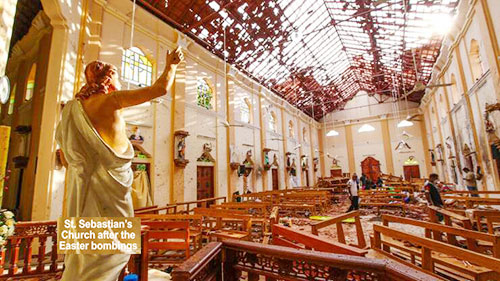
By Sanja de Silva Jayatilleka
I do not know Hejaaz Hizbullah. I have come to know of him from the several accounts published in the media over the past few months, by a classmate, a contemporary and colleague, a student and a brother. I do not know what pain of mind he must feel, isolated in a cell, without being charged, but accused of a heinous crime by the authorities and judged variously in the careless courts of public opinion. But I do feel pained, for him, for us on this island. This cannot be our lot, in this age, at this time. We cannot settle for such a future, for any of us.
I do not know why he chose to become a lawyer. From what I hear, he was extremely good at his job, ending up a Supreme Court lawyer at a young age. I do know what it is to want to study law, because that was my dream, too, and qualified to do so at university entrance, although my life took a different turn. Despite all the failures, delays and shortcomings of the legal system, young people still aspire to practice law, and people still want to believe in the justice system, and hope against hope that it broadly works.
I do not know of his alleged association with the perpetrators of the Easter Sunday bombings. I do know that after that fateful day in April 2019, things were never the same for many people. I was in Moscow, but distance didn’t make much difference. Russians cried, and young people came in groups to place flowers outside the Embassy, hanging around the Buddha statue at the front of the Embassy in disbelief, lit candles, prayed. Eight purple-robed Bishops conducted the service we requested for the victims at the Catholic Cathedral in Moscow, and unprecedentedly, the Church was filled with the diplomatic corps.
I do not know what motivated him to be an activist who helped people with various issues. I do know that his schoolmates and colleagues and students were impressed by his sincerity and dedication, because he seemed to have shown early signs that he cared about people. Those who knew him seem to be stunned that he should be involved in anything as mindlessly evil and brutal as a massacre of worshippers.
I do not know why the suicide-bombers chose Catholic worshippers in church on Easter, to carry out their carnage. I do know that there was no history of animosity, conflict or any kind of ill-feeling between Muslims and Christians of any denomination, on this island, which had seen plenty of violence of many sorts, including ethnic and religious, in its long history. As such, this was a shock and all the explanations and speculations by the confused don’t really make sense.
I do not know who his clients were as a lawyer. I do know that lawyers defend all sorts of criminals, because they are considered innocent until proven guilty. This is the only guarantee that we as citizens have of getting representation in a court of law, if by some unfortunate turn of fate one is accused of some crime one did not commit. It is a lawyer who can ensure the protection of the law to those unfamiliar with the legal arguments, as most of us are, and justice for the innocent.
I do not know why the authorities haven’t charged him. I do know that what he is accused of is to do with an involvement in a crime so heinous that in this country, it has been paralleled only by the Tigers killing worshippers at Anuradhapura (1985) and Kattankudy (1990). There is something particularly sickening in killing worshippers at a shrine, whatever the cause that set the killers on a path of violence.
I do not know how many others are in the same plight, incarcerated without adequate evidence for the purported crime, not properly charged, bewildered at their sudden removal away from their families, from everyday life, and not knowing how long the nightmare would last. I do know, only second hand, the feeling of utter horror and despair of such a fate as the pages of a novel by Kafka came alive for me.
I do not know how long it will take to bring justice to the innocent victims of the Easter bombings. I do know that Malcom Cardinal Ranjith has been urging it upon the government; this one, and the previous one. It is his flock that faced the horror of seeing their loved ones blown to pieces, the blood-splattered image of the risen Christ against the backdrop of utter destruction inside the Kochchikade Church becoming the unforgettable symbol globally, of that utterly inexplicable avalanche of terror upon Easter worshippers.
I do not know if the authorities will ever be able to bring closure to those who are left behind, those who suffer every day, the loss of their loved ones. The problem with suicide-bombers is also that some of the evidence dies with them. I do know that there were many mistakes made in failing to prevent such a shocking event, that governments changed as the voters gave their verdict.
I do not know if the inquiries will yield proper results or if it’s even possible. I do know that even if nothing comes of the inquiries anytime soon, there is something that a government can do, so as not to make things worse for the people. And that is not to pour vinegar on the wound. Every day that an innocent person suffers in prison without charge while the authorities scramble for evidence, and as days turn into months, the collective wounds of those left behind looking for answers, are renewed and their insecurities are redoubled. It begins to look like someone is being made a scapegoat because there is not much else the authorities can do.
I do not know if anyone’s listening. But I do know that people are speaking. They want peace. They want to know they are safe. They want to know that the right people are punished, but that there are no more innocent victims of a tragedy already too horrific to forget. Nobody asks for a show trial to appease the calls for Justice, where yet another innocent life, and those of his family are ruined. That is not Justice for the victims of the Easter bombings. But for the grace of God, it may well have been their lives, their families. People want to know that the authorities can be trusted to release those who may be innocent, if no evidence is available to prove the contrary. They, “would not condemn the innocent”.
Blessed are those who are merciful.
- News Advertiesment
See Kapruka’s top selling online shopping categories such as Toys, Grocery, Flowers, Birthday Cakes, Fruits, Chocolates, Clothing and Electronics. Also see Kapruka’s unique online services such as Money Remittence,News, Courier/Delivery, Food Delivery and over 700 top brands. Also get products from Amazon & Ebay via Kapruka Gloabal Shop into Sri Lanka.
Midweek Review
‘Professor of English Language Teaching’
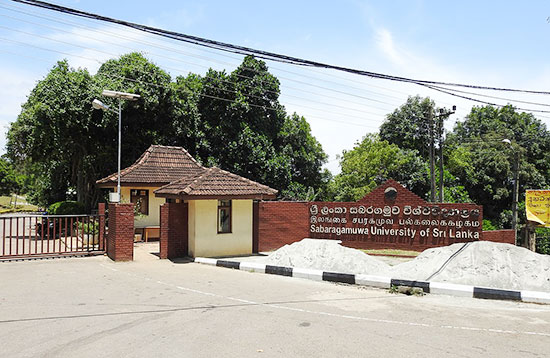
It is a pleasure to be here today, when the University resumes postgraduate work in English and Education which we first embarked on over 20 years ago. The presence of a Professor on English Language Teaching from Kelaniya makes clear that the concept has now been mainstreamed, which is a cause for great satisfaction.
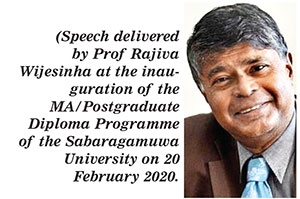 Twenty years ago, this was not the case. Our initiative was looked at askance, as indeed was the initiative which Prof. Arjuna Aluwihare engaged in as UGC Chairman to make degrees in English more widely available. Those were the days in which the three established Departments of English in the University system, at Peradeniya and Kelaniya and Colombo, were unbelievably conservative. Their contempt for his efforts made him turn to Sri Jayewardenepura, which did not even have a Department of English then and only offered it as one amongst three subjects for a General Degree.
Twenty years ago, this was not the case. Our initiative was looked at askance, as indeed was the initiative which Prof. Arjuna Aluwihare engaged in as UGC Chairman to make degrees in English more widely available. Those were the days in which the three established Departments of English in the University system, at Peradeniya and Kelaniya and Colombo, were unbelievably conservative. Their contempt for his efforts made him turn to Sri Jayewardenepura, which did not even have a Department of English then and only offered it as one amongst three subjects for a General Degree.
Ironically, the most dogmatic defence of this exclusivity came from Colombo, where the pioneer in English teaching had been Prof. Chitra Wickramasuriya, whose expertise was, in fact, in English teaching. But her successor, when I tried to suggest reforms, told me proudly that their graduates could go on to do postgraduate degrees at Cambridge. I suppose that, for generations brought up on idolization of E. F. C. Ludowyke, that was the acme of intellectual achievement.
I should note that the sort of idealization of Ludowyke, the then academic establishment engaged in was unfair to a very broadminded man. It was the Kelaniya establishment that claimed that he ‘maintained high standards, but was rarefied and Eurocentric and had an inhibiting effect on creative writing’. This was quite preposterous coming from someone who removed all Sri Lankan and other post-colonial writing from an Advanced Level English syllabus. That syllabus, I should mention, began with Jacobean poetry about the cherry-cheeked charms of Englishwomen. And such a characterization of Ludowyke totally ignored his roots in Sri Lanka, his work in drama which helped Sarachchandra so much, and his writing including ‘Those Long Afternoons’, which I am delighted that a former Sabaragamuwa student, C K Jayanetti, hopes to resurrect.
I have gone at some length into the situation in the nineties because I notice that your syllabus includes in the very first semester study of ‘Paradigms in Sri Lankan English Education’. This is an excellent idea, something which we did not have in our long-ago syllabus. But that was perhaps understandable since there was little to study then except a history of increasing exclusivity, and a betrayal of the excuse for getting the additional funding those English Departments received. They claimed to be developing teachers of English for the nation; complete nonsense, since those who were knowledgeable about cherries ripening in a face were not likely to move to rural areas in Sri Lanka to teach English. It was left to the products of Aluwihare’s initiative to undertake that task.
Another absurdity of that period, which seems so far away now, was resistance to training for teaching within the university system. When I restarted English medium education in the state system in Sri Lanka, in 2001, and realized what an uphill struggle it was to find competent teachers, I wrote to all the universities asking that they introduce modules in teacher training. I met condign refusal from all except, I should note with continuing gratitude, from the University of Sri Jayewardenepura, where Paru Nagasunderam introduced it for the external degree. When I started that degree, I had taken a leaf out of Kelaniya’s book and, in addition to English Literature and English Language, taught as two separate subjects given the language development needs of students, made the third subject Classics. But in time I realized that was not at all useful. Thankfully, that left a hole which ELT filled admirably at the turn of the century.
The title of your keynote speaker today, Professor of English Language Teaching, is clear evidence of how far we have come from those distant days, and how thankful we should be that a new generation of practical academics such as her and Dinali Fernando at Kelaniya, Chitra Jayatilleke and Madhubhashini Ratnayake at USJP and the lively lot at the Postgraduate Institute of English at the Open University are now making the running. I hope Sabaragamuwa under its current team will once again take its former place at the forefront of innovation.
To get back to your curriculum, I have been asked to teach for the paper on Advanced Reading and Writing in English. I worried about this at first since it is a very long time since I have taught, and I feel the old energy and enthusiasm are rapidly fading. But having seen the care with which the syllabus has been designed, I thought I should try to revive my flagging capabilities.
However, I have suggested that the university prescribe a textbook for this course since I think it is essential, if the rounded reading prescribed is to be done, that students should have ready access to a range of material. One of the reasons I began while at the British Council an intensive programme of publications was that students did not read round their texts. If a novel was prescribed, they read that novel and nothing more. If particular poems were prescribed, they read those poems and nothing more. This was especially damaging in the latter case since the more one read of any poet the more one understood what he was expressing.
Though given the short notice I could not prepare anything, I remembered a series of school textbooks I had been asked to prepare about 15 years ago by International Book House for what were termed international schools offering the local syllabus in the English medium. Obviously, the appalling textbooks produced by the Ministry of Education in those days for the rather primitive English syllabus were unsuitable for students with more advanced English. So, I put together more sophisticated readers which proved popular. I was heartened too by a very positive review of these by Dinali Fernando, now at Kelaniya, whose approach to students has always been both sympathetic and practical.
I hope then that, in addition to the texts from the book that I will discuss, students will read other texts in the book. In addition to poetry and fiction the book has texts on politics and history and law and international relations, about which one would hope postgraduate students would want some basic understanding.
Similarly, I do hope whoever teaches about Paradigms in English Education will prescribe a textbook so that students will understand more about what has been going on. Unfortunately, there has been little published about this but at least some students will I think benefit from my book on English and Education: In Search of Equity and Excellence? which Godage & Bros brought out in 2016. And then there was Lakmahal Justified: Taking English to the People, which came out in 2018, though that covers other topics too and only particular chapters will be relevant.
The former book is bulky but I believe it is entertaining as well. So, to conclude I will quote from it, to show what should not be done in Education and English. For instance, it is heartening that you are concerned with ‘social integration, co-existence and intercultural harmony’ and that you want to encourage ‘sensitivity towards different cultural and linguistic identities’. But for heaven’s sake do not do it as the NIE did several years ago in exaggerating differences. In those dark days, they produced textbooks which declared that ‘Muslims are better known as heavy eaters and have introduced many tasty dishes to the country. Watalappam and Buriani are some of these dishes. A distinguished feature of the Muslims is that they sit on the floor and eat food from a single plate to show their brotherhood. They eat string hoppers and hoppers for breakfast. They have rice and curry for lunch and dinner.’ The Sinhalese have ‘three hearty meals a day’ and ‘The ladies wear the saree with a difference and it is called the Kandyan saree’. Conversely, the Tamils ‘who live mainly in the northern and eastern provinces … speak the Tamil language with a heavy accent’ and ‘are a close-knit group with a heavy cultural background’’.
And for heaven’s sake do not train teachers by telling them that ‘Still the traditional ‘Transmission’ and the ‘Transaction’ roles are prevalent in the classroom. Due to the adverse standard of the school leavers, it has become necessary to develop the learning-teaching process. In the ‘Transmission’ role, the student is considered as someone who does not know anything and the teacher transmits knowledge to him or her. This inhibits the development of the student.
In the ‘Transaction’ role, the dialogue that the teacher starts with the students is the initial stage of this (whatever this might be). Thereafter, from the teacher to the class and from the class to the teacher, ideas flow and interaction between student-student too starts afterwards and turns into a dialogue. From known to unknown, simple to complex are initiated and for this to happen, the teacher starts questioning.’
And while avoiding such tedious jargon, please make sure their command of the language is better than to produce sentences such as these, or what was seen in an English text, again thankfully several years ago:
Read the story …
Hello! We are going to the zoo. “Do you like to join us” asked Sylvia. “Sorry, I can’t I’m going to the library now. Anyway, have a nice time” bye.
So Syliva went to the zoo with her parents. At the entrance her father bought tickets. First, they went to see the monkeys
She looked at a monkey. It made a funny face and started swinging Sylvia shouted: “He is swinging look now it is hanging from its tail its marvellous”
“Monkey usually do that’
I do hope your students will not hang from their tails as these monkeys do.
Midweek Review
Little known composers of classical super-hits
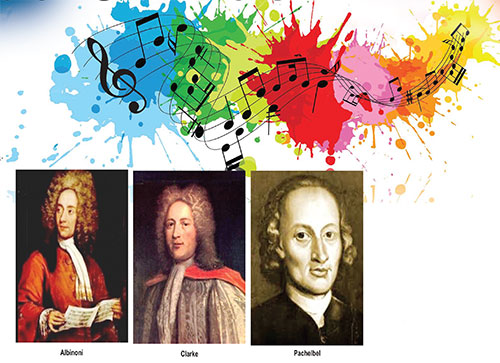
By Satyajith Andradi
Quite understandably, the world of classical music is dominated by the brand images of great composers. It is their compositions that we very often hear. Further, it is their life histories that we get to know. In fact, loads of information associated with great names starting with Beethoven, Bach and Mozart has become second nature to classical music aficionados. The classical music industry, comprising impresarios, music publishers, record companies, broadcasters, critics, and scholars, not to mention composers and performers, is largely responsible for this. However, it so happens that classical music lovers are from time to time pleasantly struck by the irresistible charm and beauty of classical pieces, the origins of which are little known, if not through and through obscure. Intriguingly, most of these musical gems happen to be classical super – hits. This article attempts to present some of these famous pieces and their little-known composers.
Pachelbel’s Canon in D
The highly popular piece known as Pachelbel’s Canon in D constitutes the first part of Johann Pachelbel’s ‘Canon and Gigue in D major for three violins and basso continuo’. The second part of the work, namely the gigue, is rarely performed. Pachelbel was a German organist and composer. He was born in Nuremburg in 1653, and was held in high esteem during his life time. He held many important musical posts including that of organist of the famed St Stephen’s Cathedral in Vienna. He was the teacher of Bach’s elder brother Johann Christoph. Bach held Pachelbel in high regard, and used his compositions as models during his formative years as a composer. Pachelbel died in Nuremburg in 1706.
Pachelbel’s Canon in D is an intricate piece of contrapuntal music. The melodic phrases played by one voice are strictly imitated by the other voices. Whilst the basso continuo constitutes a basso ostinato, the other three voices subject the original tune to tasteful variation. Although the canon was written for three violins and continuo, its immense popularity has resulted in the adoption of the piece to numerous other combinations of instruments. The music is intensely soothing and uplifting. Understandingly, it is widely played at joyous functions such as weddings.
Jeremiah Clarke’s Trumpet Voluntary
The hugely popular piece known as ‘Jeremiah Clarke’s Trumpet Voluntary’ appeared originally as ‘ The Prince of Denmark’s March’ in Jeremiah Clarke’s book ‘ Choice lessons for the Harpsichord and Spinet’, which was published in 1700 ( Michael Kennedy; Oxford Dictionary of Music ). Sometimes, it has also been erroneously attributed to England’s greatest composer Henry Purcell (1659 – 1695 ) and called ‘Purcell’s Trumpet Voluntary (Percy A. Scholes ; Oxford Companion to Music). This brilliant composition is often played at joyous occasions such as weddings and graduation ceremonies. Needless to say, it is a piece of processional music, par excellence. As its name suggests, it is probably best suited for solo trumpet and organ. However, it is often played for different combinations of instruments, with or without solo trumpet. It was composed by the English composer and organist Jeremiah Clarke.
Jeremiah Clarke was born in London in 1670. He was, like his elder contemporary Pachelbel, a musician of great repute during his time, and held important musical posts. He was the organist of London’s St. Paul’s Cathedral and the composer of the Theatre Royal. He died in London in 1707 due to self – inflicted gun – shot injuries, supposedly resulting from a failed love affair.
Albinoni’s Adagio
The full title of the hugely famous piece known as ‘Albinoni’s Adagio’ is ‘Adagio for organ and strings in G minor’. However, due to its enormous popularity, the piece has been arranged for numerous combinations of instruments. It is also rendered as an organ solo. The composition, which epitomizes pathos, is structured as a chaconne with a brooding bass, which reminds of the inevitability and ever presence of death. Nonetheless, there is no trace of despondency in this ethereal music. On the contrary, its intense euphony transcends the feeling of death and calms the soul. The composition has been attributed to the Italian composer Tomaso Albinoni (1671 – 1750), who was a contemporary of Bach and Handel. However, the authorship of the work is shrouded in mystery. Michael Kennedy notes: “The popular Adagio for organ and strings in G minor owes very little to Albinoni, having been constructed from a MS fragment by the twentieth century Italian musicologist Remo Giazotto, whose copyright it is” (Michael Kennedy; Oxford Dictionary of Music).
Boccherini’s Minuet
The classical super-hit known as ‘Boccherini’s Minuet’ is quite different from ‘Albinoni’s Adagio’. It is a short piece of absolutely delightful music. It was composed by the Italian cellist and composer Luigi Boccherini. It belongs to his string quintet in E major, Op. 13, No. 5. However, due to its immense popularity, the minuet is performed on different combinations of instruments.
Boccherini was born in Lucca in 1743. He was a contemporary of Haydn and Mozart, and an elder contemporary of Beethoven. He was a prolific composer. His music shows considerable affinity to that of Haydn. He lived in Madrid for a considerable part of his life, and was attached to the royal court of Spain as a chamber composer. Boccherini died in poverty in Madrid in 1805.
Like numerous other souls, I have found immense joy by listening to popular classical pieces like Pachelbel’s Canon in D, Jeremiah Clarke’s Trumpet Voluntary, Albinoni’s Adagio and Boccherini’s Minuet. They have often helped me to unwind and get over the stresses of daily life. Intriguingly, such music has also made me wonder how our world would have been if the likes of Bach, Handel, Haydn, Mozart, Beethoven, and Schubert had never lived. Surely, the world would have been immeasurably poorer without them. However, in all probability, we would have still had Pachelbel’s Canon in D, Jeremiah Clarke’s Trumpet Voluntary, Albinoni’s Adagio, and Boccherini’s Minuet, to cheer us up and uplift our spirits.
Midweek Review
The Tax Payer and the Tough
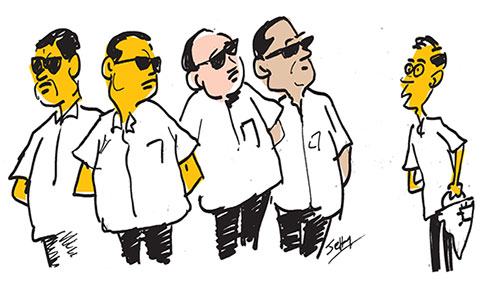
By Lynn Ockersz
The tax owed by him to Caesar,
Leaves our retiree aghast…
How is he to foot this bill,
With the few rupees,
He has scraped together over the months,
In a shrinking savings account,
While the fires in his crumbling hearth,
Come to a sputtering halt?
But in the suave villa next door,
Stands a hulk in shiny black and white,
Over a Member of the August House,
Keeping an eagle eye,
Lest the Rep of great renown,
Be besieged by petitioners,
Crying out for respite,
From worries in a hand-to-mouth life,
But this thought our retiree horrifies:
Aren’t his hard-earned rupees,
Merely fattening Caesar and his cohorts?









